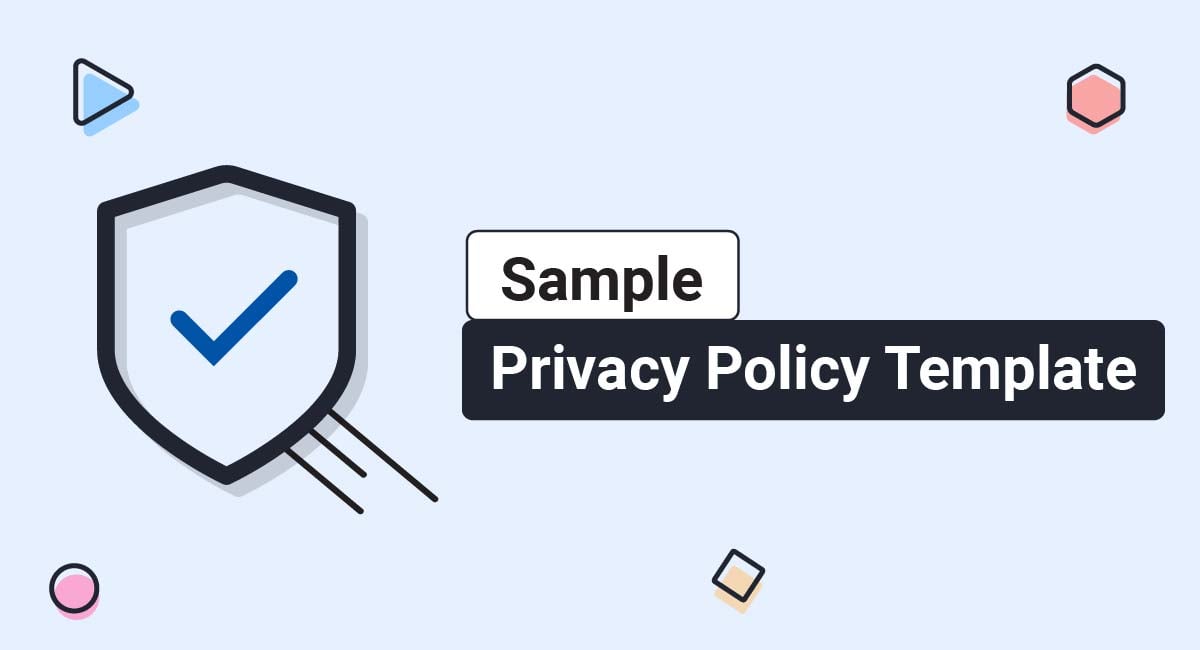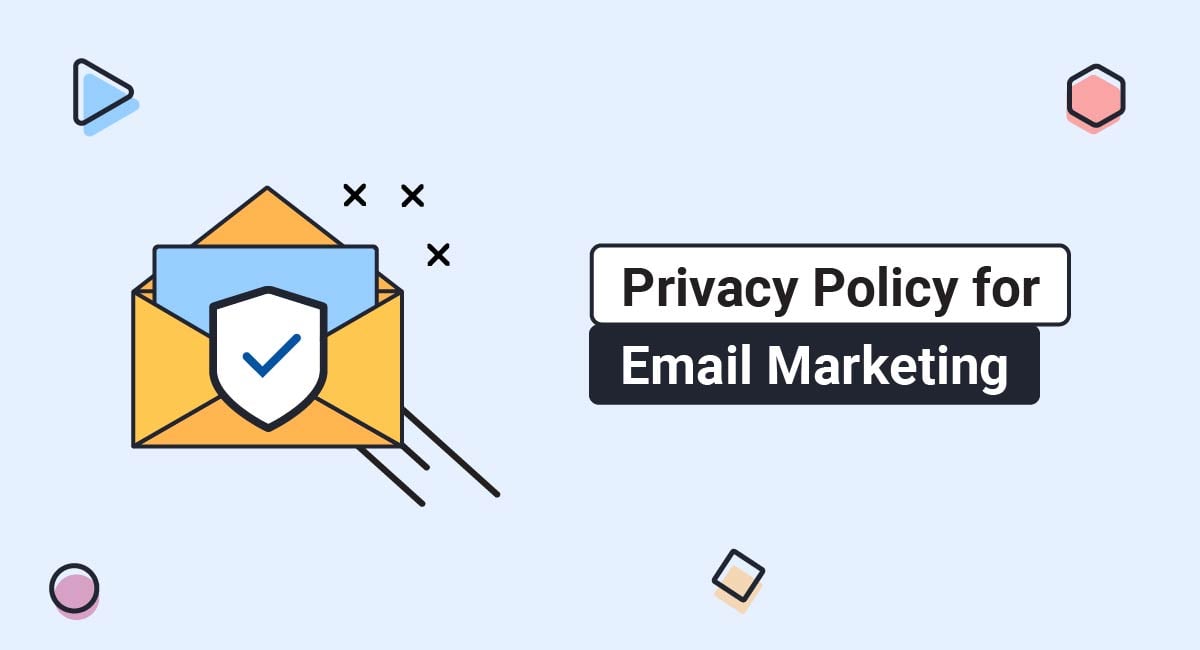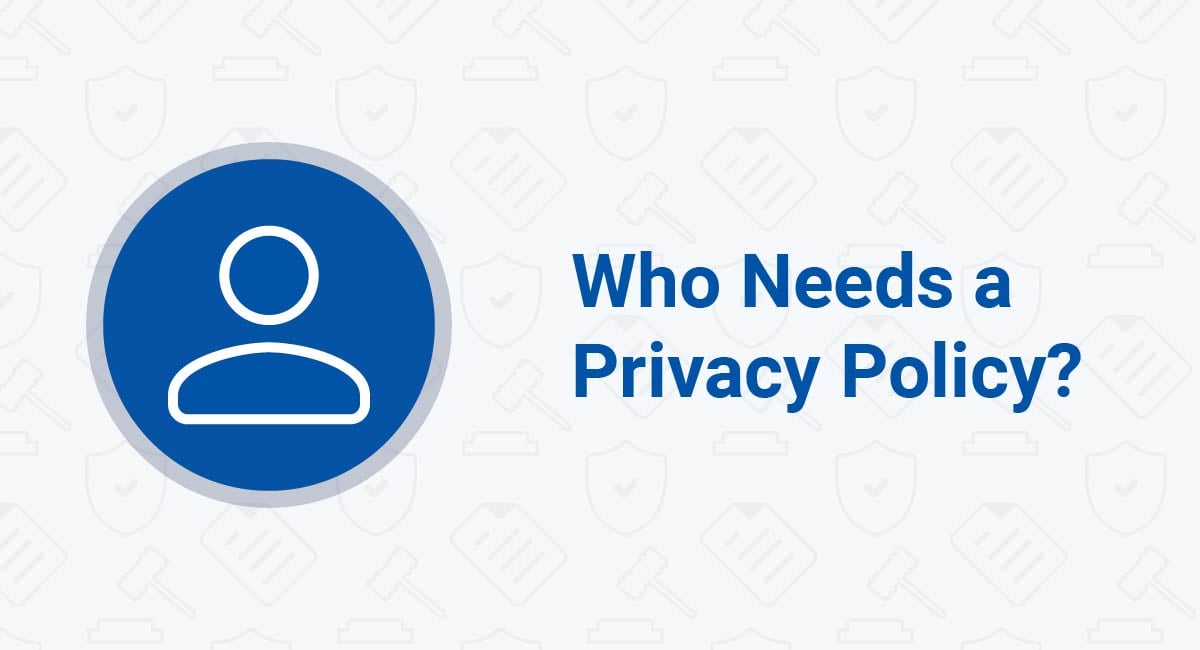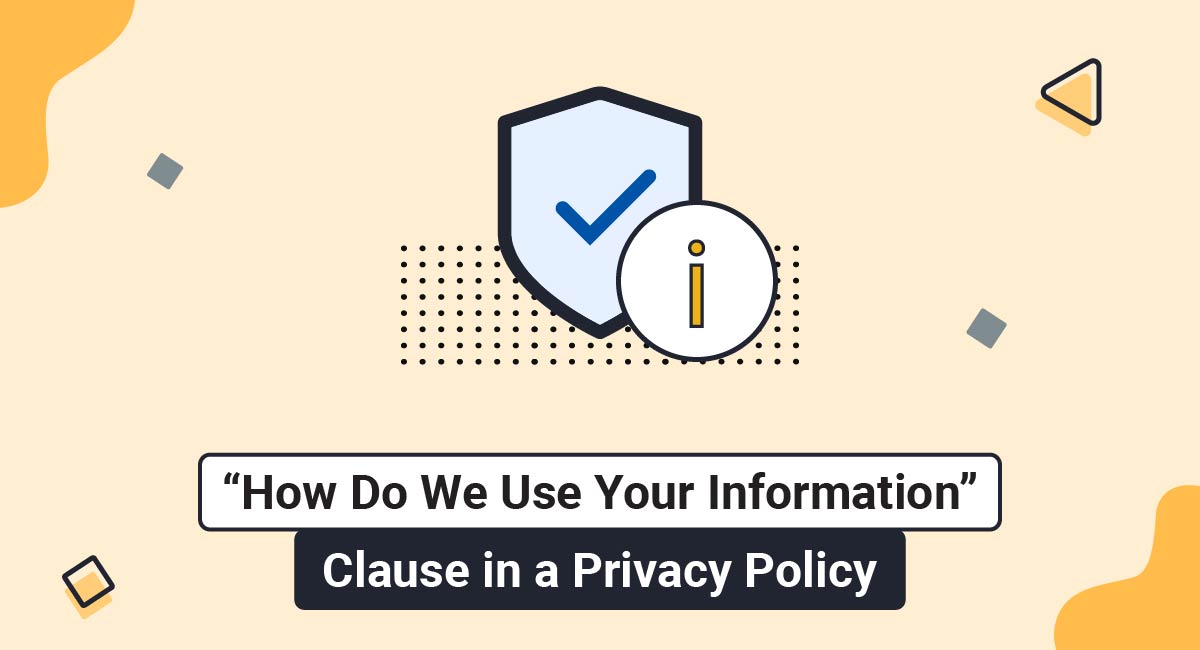A Privacy Policy is a legal document that informs the public about the data you collect, how you collect it, and how you use it, as well as other important details about your privacy practices.
This article will explain in further detail what a Privacy Policy is, why and when one is legally required, and how to create and display your own.
We've also put together a Sample Privacy Policy Template that you can use to help write your own.
- 1. What is a Privacy Policy?
- 2. A Privacy Policy is Required by Law
- 3. Third Party Services Require a Privacy Policy
- 4. Always be Transparent in Your Privacy Policy
- 5. What Should You Include in Your Privacy Policy
- 5.1. What information do you collect?
- 5.2. What do you do with the information you collect?
- 5.3. How is collected information kept safe?
- 5.4. Do users under the age of 13 use your website?
- 5.5. Do you handle medical data?
- 5.6. Do you handle financial or credit data?
- 5.7. Does your website or app utilize third-party services?
- 6. Privacy Policy FAQs
- 7. Privacy Policy Examples
- 7.1. The New York Times
- 7.2. The National Review
- 8. How to Display and Get Agreement to a Privacy Policy
- 9. Summary of What a Privacy Policy Is
- 10. Download Sample Privacy Policy Template
- 10.1. Sample Privacy Policy Template (HTML Text Download)
- 10.2. Sample Privacy Policy Template (PDF Download)
- 10.3. Sample Privacy Policy Template (Word DOCX Download)
- 10.4. Sample Privacy Policy Template (Google Docs)
- 10.5. More Privacy Policy Templates
What is a Privacy Policy?
A properly written Privacy Policy tells customers what data you collect about them when they engage with your business (e.g., through your website) or purchase one of your products/services, and why you're collecting that information. It also lets people know how long their information will be stored, who can access these records and more.
So, a good Privacy Policy should outline what data is being collected and explain why you're collecting it, who has access to it, and the time frame during which you plan to store it. It should also include any third parties with whom your company shares personal or private information, as well as any steps taken to ensure the security of such information.
Our Privacy Policy Generator makes it easy to create a Privacy Policy for your business. Just follow these steps:
At Step 1, select the Website option or App option or both.

Answer some questions about your website or app.

Answer some questions about your business.

Enter the email address where you'd like the Privacy Policy delivered and click "Generate."

You'll be able to instantly access and download your new Privacy Policy.
A Privacy Policy is Required by Law
Privacy Policies are required by law to be posted on your website. You may be required to include specific clauses in your Privacy Policy, depending on the applicable laws within your area or where you are conducting business.
In fact, privacy laws are in place in many countries around the world, including the following:
- Canada's Personal Information Protection and Electronic Documents Act (PIPEDA)
- The California Online Privacy Protection Act (CalOPPA)
- The California Consumer Privacy Act (CCPA) as amended by the California Privacy Rights Act (CPRA)
- Europe's General Data Protection Regulation (GDPR)
- Australia's Privacy Act
- The UK's Data Protection Act
Third Party Services Require a Privacy Policy
Many third-party services that you use to improve your website's user experience, monitor analytics, or display ads require you to post a Privacy Policy.
You should provide clauses detailing how you use third-party services, APIs and SDKs.
Just some of the most popular third-party services, which require you to post a Privacy Policy are:
- Google Analytics
- Google AdSense
- Google AdWords
- Amazon Associates
- ClickBank
- Twitter Lead Generation
- Facebook Pages, Stores and Apps
- Google Play Store
- Apple's App Store
A few of the reasons these third-party services require you to post a Privacy Policy and disclose your usage of their cookies and services are due to the fact that they place cookies on your visitors' computers. They also collect information about them whenever they visit your site, such as their browsing habits, the device used, and so on.
Always be Transparent in Your Privacy Policy
A transparent and complete Privacy Policy agreement, which explains exactly what information a company collects and how it uses that information, inspires trust in a business.
Trust is essential for companies whose business models are based on sensitive customer data. Users feel secure knowing they have control over their personal information under the terms they signed up for.
Your Privacy Policy should explain to your users how your app or website handles personal data. Your users should also be aware of the reasons for collecting information and how long they will be kept on your servers.
You must disclose even if you do not collect any personal information. Because users expect transparency, it helps to have a Privacy Policy. Users may believe that you are collecting too much personal information and not disclosing any.
The SwissCows search engine doesn't track or store user searches. Its Privacy Policy says that it only collects the data that is necessary to provide its services and stores it in an anonymized way:
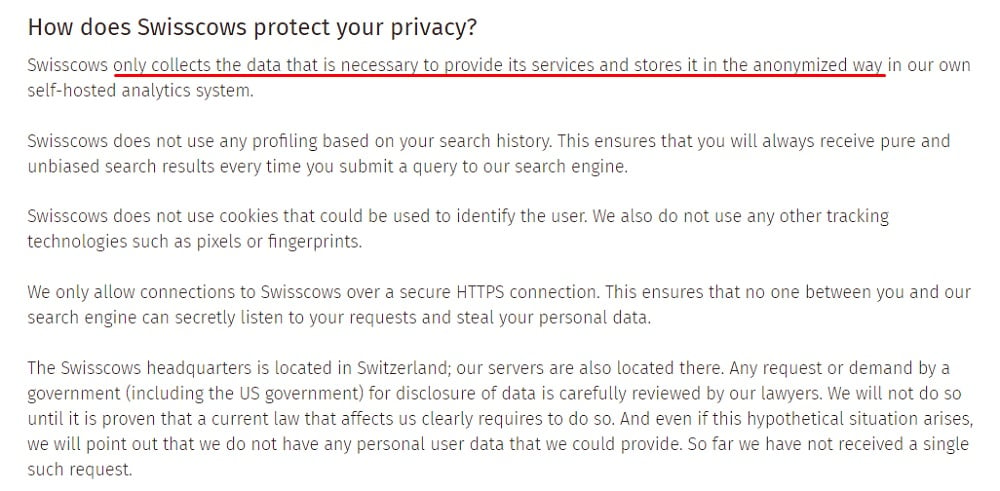
Conduct a privacy audit to ensure transparency and accuracy in your Privacy Policy. This will enable you to determine your business's privacy practices and what information you must disclose to your users through an appropriately transparent Privacy Policy.
What Should You Include in Your Privacy Policy
Your Privacy Policy will contain a variety of clauses depending on your business type and applicable law. Accordingly, there are certain clauses that every website, which collects personal data from visitors, should include in their Privacy Policies.
It should be structured to make it easy for the reader to understand essential information. You can achieve this by using well-structured, clearly written clauses that are clearly identified with descriptive headlines.
With that in mind, let's take a look at what you should include in your Privacy Policy.
What information do you collect?
Letting your website's visitors know what information you collect is an essential part of any Privacy Policy. This clause is crucial to let your users know from the beginning if you intend to collect data that they are comfortable sharing.
For instance, a website could use a registration form to collect an individual's email address, which the company then adds to its mailing list. This is very different from an app that collects all kinds of personal data, such as name, address, payment information, and location.
The point here is that there is a worldwide consensus that users have the right to know exactly what kind of data you collect.
Here's an example of a clause that lets users know what kinds of information it uses and collects:
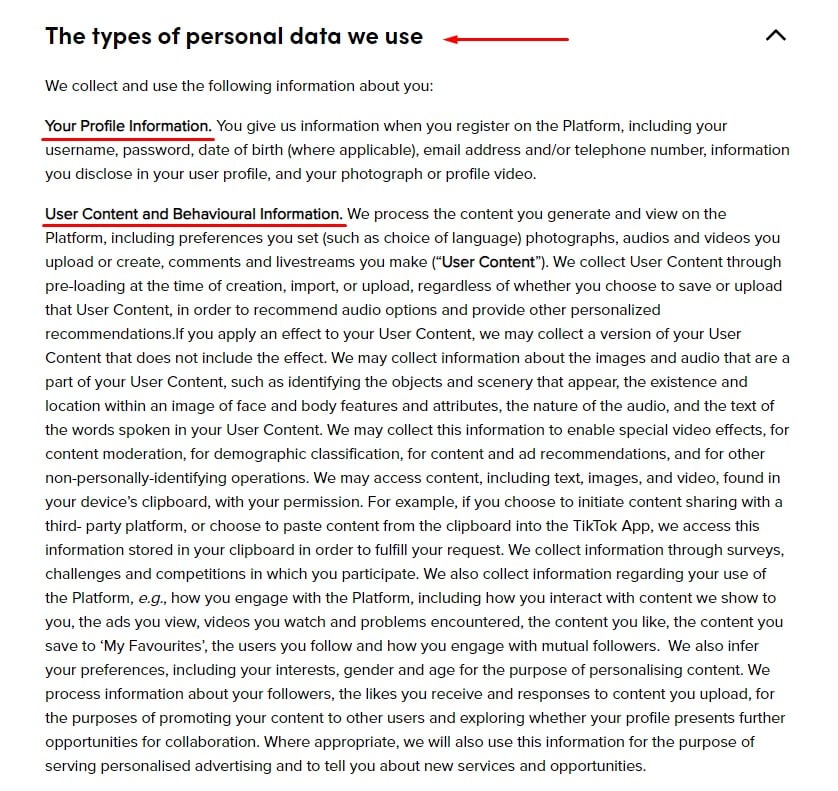
You must also keep in mind that privacy laws generally stipulate that you may only collect personal information if necessary to offer the services you provide.
What do you do with the information you collect?
This clause informs the user about what happens to their personal data after it is collected.
A website might collect information such as a user's address and name in order to ship products purchased online. This information is essential and is not collected more than necessary. This is very different from a website that collects users' names and addresses and then sells it to a third party for marketing purposes.
Both websites collect the same information, but it is vital that you disclose how this information is used once it has been collected.
Here's an example of how to disclose what is done with the information a business collects:
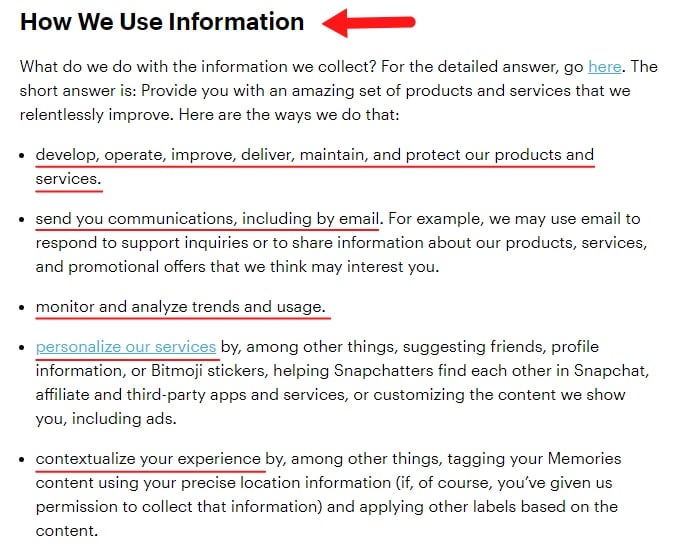
How is collected information kept safe?
Personal data that is collected from an individual must be kept secure and only accessible by authorized personnel. You must implement appropriate security measures if you are trusted with handling personal data about users.
For example, to prevent unauthorized people from stealing or hacking your customer's credit card information, you need to secure it behind firewalls.
Data breaches have been affecting millions of internet users over the last few years. Many of those affected faced severe legal and financial consequences. You are responsible to make sure that personal information is not lost or misused if you store it.
Here's an example of how you can disclose how data is secured:

Do users under the age of 13 use your website?
This clause is only applicable to specific websites and apps. It is regulated primarily under COPPA (the Children's Online Privacy Protection Act). COPPA imposes special requirements on apps and websites that collect data about children. It is vital to protect the privacy of all people, but it is crucial for minors.
This is why there is an additional clause in the Privacy Policy for websites and apps that target children.
You must comply with COPPA regulations if young people use your app or website.
Here's an example of a clause addressing children's personal information:
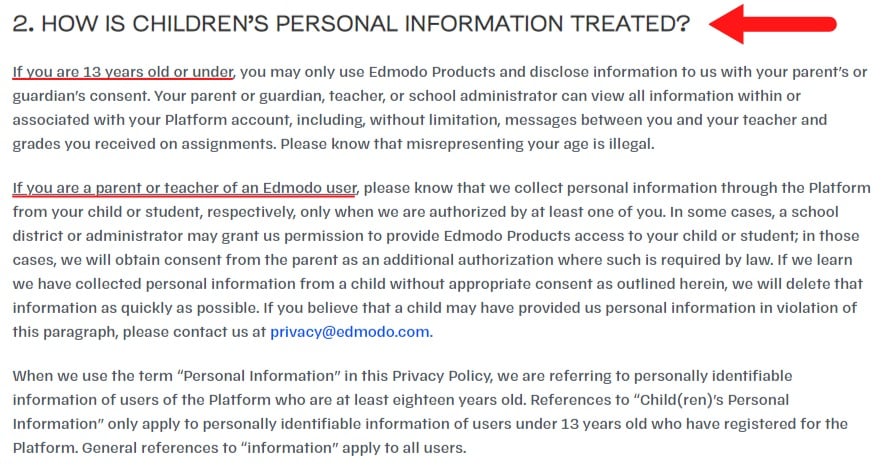
Do you handle medical data?
Extra-sensitive information such as medical information is subject to additional regulation. The main law that covers additional measures for apps and websites that contain medical and health information is HIPAA (the Health Insurance Portability and Accountability Act of 1996).
If your website or app collects health or medical information, you must comply with HIPAA regulations. Note how the health insurance company Kaiser Permanente provides a link to its HIPAA privacy notice within its main Privacy Statement:

Do you handle financial or credit data?
For obvious reasons, financial information requires greater privacy protections than usual. Because financial information and credit are more sensitive than usual, several laws govern what steps must be taken by companies to protect their users from identity theft and fraud.
You must comply with all laws governing financial information and credit information that you offer on your website or app. Kaiser Permanente has a simple statement on this subject.

Does your website or app utilize third-party services?
Privacy Policies often disclose information about third-party services used by websites. It is important to disclose information about third-party usage because the Privacy Policies of third parties may differ from yours. Users need to know who has access and what their own unique policies are, since this may affect their data.
A website might use a third-party credit card processor to process transactions. Although the website does not store or handle this transaction information, users need to be able to see who has access to their credit card information and what they do with it.
It can be as simple as providing the name of the third party and explaining why it is being used. The user can then read the third party's Privacy Policy to confirm their agreement with your website's policies.
Here is an example of this type of clause:
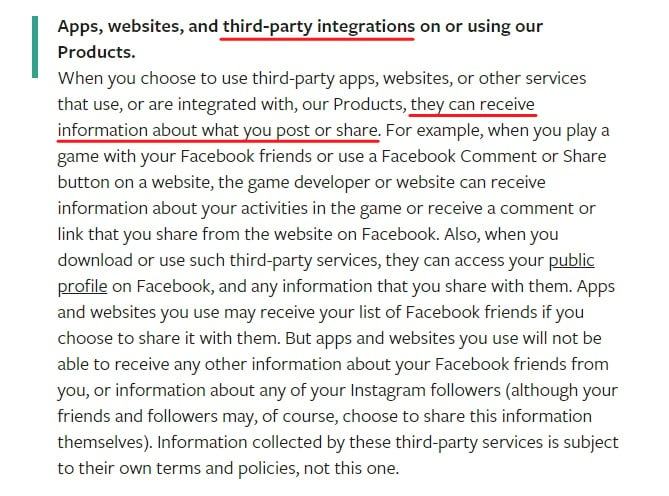
Privacy Policy FAQs
Here is a list of frequently asked questions that you may find useful.
Yes. You can download a sample Privacy Policy template for free in multiple formats: PDF, DOCX, Full Text or as a Google Docs document.
You need a Privacy Policy because privacy laws around the world require one if you collect personal information. Many third-party companies also require a Privacy Policy in order to use their services.
Even if you don't collect personal information, you should still have a Privacy Policy. This is because people and the authorities expect to see one. Without one, even one that simply says you don't collect personal information, you may come across as untrustworthy to the public and end up being questioned by authorities.
You should have a Privacy Policy even if you don't collect personal information because the general public and authorities both expect to see one.
Without a Privacy Policy, you may end up having to explain your privacy practices to legal authorities to prove that you aren't violating privacy laws. You may also lose trust with the public for not being clear about what your privacy practices are.
Even if you don't collect personal information, you should post a Privacy Policy that says exactly that.
The standard information that every Privacy Policy should include is as follows:
- What personal information you collect
- How you collect it
- Why you collect it/How you use it
- How long you keep the personal information
- How you secure it
- Whether or not you share it with any third parties
- Any rights your users have when it comes to your collection, use or retention of their personal information
- Your contact information
Note that some privacy laws require additional information if you fall under the law's scope. Some of this additional information includes:
- How you handle personal information of minors/children
- Whether you use cookies that collect personal information
- If you transfer data to other countries
- Whether you sell personal information, and how users can opt out of this
- How users can exercise their rights under specific laws
You should always display a link to your Privacy Policy in your website's footer. This is where people know to look for it, and it's a common best practice.
You should also display a Privacy Policy link at places where you request to collect personal information.
For example:
- Email newsletter sign-up forms
- Contact forms
- Account sign-up forms
- Ecommerce checkout pages
For mobile apps, the same concept applies. Add a link to your Privacy Policy in a menu within your app, such as an "About" or "Legal" menu. Also add the link to other areas of your app where you request personal information.
Make your Privacy Policy enforceable by having your users click an unticked checkbox next to a statement that says something similar to "I have read and agree to the terms of the Privacy Policy."
You can also have users click a button that says something like "I Agree" next to a statement like the above if you don't want to use a checkbox.
Generally, you need to update your Privacy Policy when any of your privacy practices change.
Some common times to update your Privacy Policy would be if you:
- Collect new types of personal information that you didn't used to collect
- Collect personal information in a new way
- Start using personal information in a way you didn't previously use it
- Change how long you retain personal information
- Start sharing personal information with a new third party
Make sure to update your Privacy Policy's effective date with the date you make the updates. Send notifications to your users of any material changes, such as via an email or a website pop-up message.
Note that some privacy laws (such as the CCPA) require you to update your Privacy Policy once every 12 months.
Privacy Policy Examples
Whether your website, mobile app, desktop or web app collects personal data from users, you must post a Privacy Policy. Many websites include a link to their Privacy Policies in the homepage footer or main navigation menu.
Let's look at some Privacy Policies on popular news websites.
The New York Times

The New York Times has the following sections in its Privacy Policy:
- What Information Do We Gather About You?
- What Do We Do With the Information We Collect About You?
- With Whom Do We Share the Information We Gather?
- What Are Your Rights?
- What About Sensitive Personal Information?
- How Long Do You Retain Data?
- How Do You Protect My Information?
- Are There Guidelines for Children?
- How Is Information Transferred Internationally?
- What Is Our Legal Basis?
- What About Links to Third Party Services?
- How Are Changes to This Privacy Policy Communicated?
- How Can You Contact Us?
- Who is the Controller of Your Personal Information?
This list is a great place to start for most Privacy Policies.
The National Review
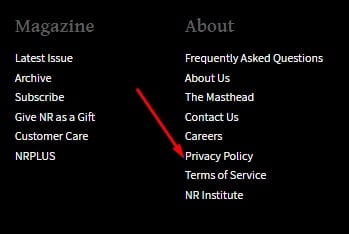
The National Review has the following sections in its Privacy Policy:
- Quick Overview of This Privacy Policy
- General Statement About This Privacy Policy
- General Statement About Data Collection & Targeted Advertising
- The Information We Collect
- How We Use The Information We Collect
- Information Sharing
- Third-Party Services
- Your Account
- Confidentiality & Security
- Additional Information for California Residents
- Privacy Policy Changes
While this policy is shorter, it still covers all the key areas and is worth checking out for inspiration and guidance on your own Privacy Policy's content and structure.
How to Display and Get Agreement to a Privacy Policy
Privacy laws require that your Privacy Policy be displayed in a way that's easy for users to access at any time. You must also get users to consent, or agree to, your processing of their personal data as stated in your policy.
When it comes to displaying your Privacy Policy, you should start with adding a link within your website's footer. This will make the policy visible and accessible from every page of your site, and people are familiar with looking here for legal agreements and important information.
Here's an example of how you can display a Privacy Policy in a site footer:
![]()
Other common places to include your Privacy Policy link are in forms where you request personal information, such as when a user creates an account with you:
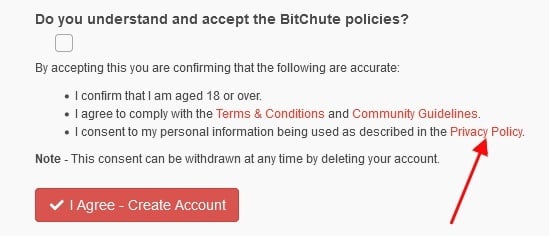
Or when they sign up to receive marketing emails from you:
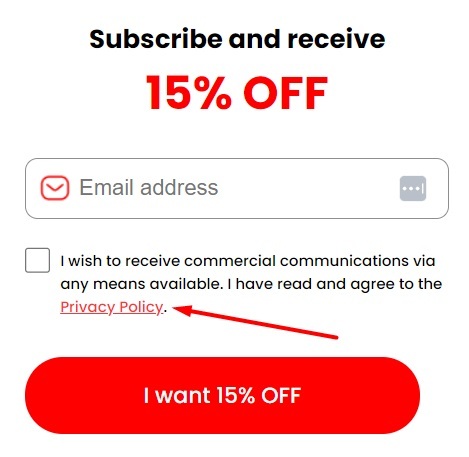
To obtain consent from users, ask them to check a box such as an "I Agree" checkbox next to a statement that clicking it shows agreement to your Privacy Policy. Link your Privacy Policy to this consent mechanism as well, as seen here:
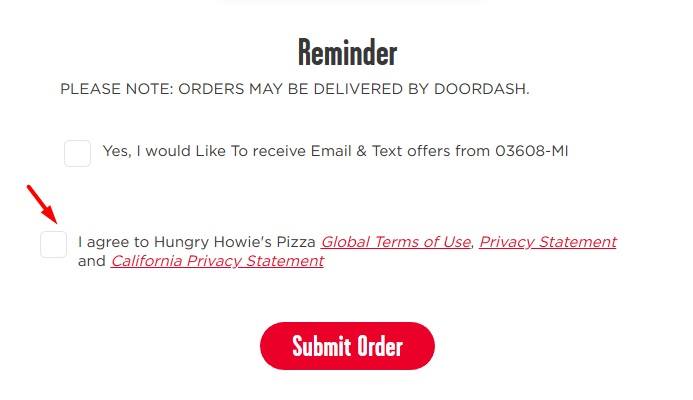
Summary of What a Privacy Policy Is
Your Privacy Policy is not just a legal requirement but also an opportunity to communicate your company's values. Think of it like the "About Us" section on your website, only more important.
It should be accurate and up-to-date with any changes in policy or practices so that you don't run into problems down the line.
Your website, web app or mobile app may collect personal data. If so, you will likely be required by law or third-party services to provide a Privacy Policy to your website/app.
Be sure to include sections on:
- What information you collect
- What you do with that information
- How you keep that information safe
- How you handle data of individuals under 13 years of age
- How you handle medical data
- How you handle financial or credit data
- How your app or website utilizes third-party services
Finally, don't be tempted to copy or use another business's Privacy Policy. The one you're copying might not be right for your business. Let's take, for example, the text of a competitor who is in the same industry.
You may be doing business differently than they are. Your competitor might collect different types of information or share it with other third parties than you do. Of course, you could edit the Privacy Policy you're copying from to make it more appropriate for your business.
But is that time better spent growing your business or creating cobbling together a Frankenpolicy?
Download Sample Privacy Policy Template
Generate a Privacy Policy in just a few minutes
We understand that writing your own Privacy Policy can seem like a daunting task. Therefore, to help you put one together without snatching your competitor's or cherry-picking bits and pieces here and there, you can use a template. Templates can provide structure and inspiration, which is a great starting point.
Alternatively, we recommend using our Privacy Policy Generator. It is a powerful tool that will ask all the right questions regarding your business and the types of information you collect. The tool will use your answers to create a professional Privacy Policy tailored to your requirements and needs.
Our Sample Privacy Policy is available for download, for free. The template includes these sections:
- Definitions
- Collecting and Using Personal Information
- Usage Data
- Use of Personal Information
- Transfer of Personal Information
- Disclosure of Personal Information
- Security of Personal Information
- GDPR Privacy Policy
- CCPA (CPRA) Privacy Policy
- Links to Other Websites
- Changes to Privacy Policy
- Contact Information
Sample Privacy Policy Template (HTML Text Download)
You can download the Sample Privacy Policy Template as HTML code below. Copy it from the box field below (right-click > Select All and then Copy-paste) and then paste it on your website pages.
Privacy Policy
Our Privacy Policy was last updated on [___DATE___].
This Privacy Policy describes Our policies and procedures on the collection, use and disclosure of Your information when You use the Service and tells You about Your privacy rights and how the law protects You.
We use Your Personal data to provide and improve the Service. By using the Service, You agree to the collection and use of information in accordance with this Privacy Policy. This Privacy Policy was generated by TermsFeed Privacy Policy Template.
Interpretation and Definitions
Interpretation
The words of which the initial letter is capitalized have meanings defined under the following conditions. The following definitions shall have the same meaning regardless of whether they appear in singular or in plural.
Definitions
For the purposes of this Privacy Policy:
"Account" means a unique account created for You to access our Service or parts of our Service.
"Business", for the purpose of the CCPA (California Consumer Privacy Act), refers to the Company as the legal entity that collects Consumers' personal information and determines the purposes and means of the processing of Consumers' personal information, or on behalf of which such information is collected and that alone, or jointly with others, determines the purposes and means of the processing of consumers' personal information, that does business in the State of California.
"Company" (referred to as either "the Company", "We", "Us" or "Our" in this Agreement) refers to [___COMPANY INFORMATION___]
For the purpose of the GDPR, the Company is the Data Controller.
"Country" refers to [___COMPANY_COUNTRY___].
"Consumer", for the purpose of the CCPA (California Consumer Privacy Act), means a natural person who is a California resident. A resident, as defined in the law, includes (1) every individual who is in the USA for other than a temporary or transitory purpose, and (2) every individual who is domiciled in the USA who is outside the USA for a temporary or transitory purpose.
"Cookies" are small files that are placed on Your computer, mobile device or any other device by a website, containing the details of Your browsing history on that website among its many uses.
"Data Controller", for the purposes of the GDPR (General Data Protection Regulation), refers to the Company as the legal person which alone or jointly with others determines the purposes and means of the processing of Personal Data.
"Device" means any device that can access the Service such as a computer, a cellphone or a digital tablet.
"Do Not Track" (DNT) is a concept that has been promoted by US regulatory authorities, in particular the U.S. Federal Trade Commission (FTC), for the Internet industry to develop and implement a mechanism for allowing internet users to control the tracking of their online activities across websites.
"Personal Data" is any information that relates to an identified or identifiable individual.
For the purposes of GDPR, Personal Data means any information relating to You such as a name, an identification number, location data, online identifier or to one or more factors specific to the physical, physiological, genetic, mental, economic, cultural or social identity.
For the purposes of the CCPA, Personal Data means any information that identifies, relates to, describes or is capable of being associated with, or could reasonably be linked, directly or indirectly, with You.
"Sale", for the purpose of the CCPA (California Consumer Privacy Act), means selling, renting, releasing, disclosing, disseminating, making available, transferring, or otherwise communicating orally, in writing, or by electronic or other means, a Consumer's personal information to another business or a third party for monetary or other valuable consideration.
"Service" refers to the Website.
"Service Provider" means any natural or legal person who processes the data on behalf of the Company. It refers to third-party companies or individuals employed by the Company to facilitate the Service, to provide the Service on behalf of the Company, to perform services related to the Service or to assist the Company in analyzing how the Service is used.
For the purpose of the GDPR, Service Providers are considered Data Processors."Usage Data" refers to data collected automatically, either generated by the use of the Service or from the Service infrastructure itself (for example, the duration of a page visit).
"Website" refers to [___WEBSITE NAME___], accessible from [___WEBSITE_URL___]
"You" means the individual accessing or using the Service, or the company, or other legal entity on behalf of which such individual is accessing or using the Service, as applicable.
Under GDPR (General Data Protection Regulation), You can be referred to as the Data Subject or as the User as you are the individual using the Service.
Collecting and Using Your Personal Data
Types of Data Collected
Personal Data
While using Our Service, We may ask You to provide Us with certain personally identifiable information that can be used to contact or identify You. Personally identifiable information may include, but is not limited to:
Email address
First name and last name
Phone number
Address, State, Province, ZIP/Postal code, City
Usage Data
Usage Data
Usage Data is collected automatically when using the Service.
Usage Data may include information such as Your Device's Internet Protocol address (e.g. IP address), browser type, browser version, the pages of our Service that You visit, the time and date of Your visit, the time spent on those pages, unique device identifiers and other diagnostic data.
When You access the Service by or through a mobile device, We may collect certain information automatically, including, but not limited to, the type of mobile device You use, Your mobile device unique ID, the IP address of Your mobile device, Your mobile operating system, the type of mobile Internet browser You use, unique device identifiers and other diagnostic data.
We may also collect information that Your browser sends whenever You visit our Service or when You access the Service by or through a mobile device.
Tracking Technologies and Cookies
We use Cookies and similar tracking technologies to track the activity on Our Service and store certain information. Tracking technologies used are beacons, tags, and scripts to collect and track information and to improve and analyze Our Service. The technologies We use may include:
- Cookies or Browser Cookies. A cookie is a small file placed on Your Device. You can instruct Your browser to refuse all Cookies or to indicate when a Cookie is being sent. However, if You do not accept Cookies, You may not be able to use some parts of our Service. Unless you have adjusted Your browser setting so that it will refuse Cookies, our Service may use Cookies.
- Web Beacons. Certain sections of our Service and our emails may contain small electronic files known as web beacons (also referred to as clear gifs, pixel tags, and single-pixel gifs) that permit the Company, for example, to count users who have visited those pages or opened an email and for other related website statistics (for example, recording the popularity of a certain section and verifying system and server integrity).
Cookies can be "Persistent" or "Session" Cookies. Persistent Cookies remain on Your personal computer or mobile device when You go offline, while Session Cookies are deleted as soon as You close Your web browser.
We use both Session and Persistent Cookies for the purposes set out below:
Necessary / Essential Cookies
Type: Session Cookies
Administered by: Us
Purpose: These Cookies are essential to provide You with services available through the Website and to enable You to use some of its features. They help to authenticate users and prevent fraudulent use of user accounts. Without these Cookies, the services that You have asked for cannot be provided, and We only use these Cookies to provide You with those services.
Cookies Policy / Notice Acceptance Cookies
Type: Persistent Cookies
Administered by: Us
Purpose: These Cookies identify if users have accepted the use of cookies on the Website.
Functionality Cookies
Type: Persistent Cookies
Administered by: Us
Purpose: These Cookies allow us to remember choices You make when You use the Website, such as remembering your login details or language preference. The purpose of these Cookies is to provide You with a more personal experience and to avoid You having to re-enter your preferences every time You use the Website.
Tracking and Performance Cookies
Type: Persistent Cookies
Administered by: Third-Parties
Purpose: These Cookies are used to track information about traffic to the Website and how users use the Website. The information gathered via these Cookies may directly or indirectly identify you as an individual visitor. This is because the information collected is typically linked to a pseudonymous identifier associated with the device you use to access the Website. We may also use these Cookies to test new pages, features or new functionality of the Website to see how our users react to them.
For more information about the cookies we use and your choices regarding cookies, please visit our Cookies Policy or the Cookies section of our Privacy Policy.
Use of Your Personal Data
The Company may use Personal Data for the following purposes:
To provide and maintain our Service, including to monitor the usage of our Service.
To manage Your Account: to manage Your registration as a user of the Service. The Personal Data You provide can give You access to different functionalities of the Service that are available to You as a registered user.
For the performance of a contract: the development, compliance and undertaking of the purchase contract for the products, items or services You have purchased or of any other contract with Us through the Service.
To contact You: To contact You by email, telephone calls, SMS, or other equivalent forms of electronic communication, such as a mobile application's push notifications regarding updates or informative communications related to the functionalities, products or contracted services, including the security updates, when necessary or reasonable for their implementation.
To provide You with news, special offers and general information about other goods, services and events which we offer that are similar to those that you have already purchased or enquired about unless You have opted not to receive such information.
To manage Your requests: To attend and manage Your requests to Us.
For business transfers: We may use Your information to evaluate or conduct a merger, divestiture, restructuring, reorganization, dissolution, or other sale or transfer of some or all of Our assets, whether as a going concern or as part of bankruptcy, liquidation, or similar proceeding, in which Personal Data held by Us about our Service users is among the assets transferred.
For other purposes: We may use Your information for other purposes, such as data analysis, identifying usage trends, determining the effectiveness of our promotional campaigns and to evaluate and improve our Service, products, services, marketing and your experience.
We may share Your personal information in the following situations:
- With Service Providers: We may share Your personal information with Service Providers to monitor and analyze the use of our Service, for payment processing, to contact You.
- For business transfers: We may share or transfer Your personal information in connection with, or during negotiations of, any merger, sale of Company assets, financing, or acquisition of all or a portion of Our business to another company.
- With Affiliates: We may share Your information with Our affiliates, in which case we will require those affiliates to honor this Privacy Policy. Affiliates include Our parent company and any other subsidiaries, joint venture partners or other companies that We control or that are under common control with Us.
- With business partners: We may share Your information with Our business partners to offer You certain products, services or promotions.
- With other users: when You share personal information or otherwise interact in the public areas with other users, such information may be viewed by all users and may be publicly distributed outside.
- With Your consent: We may disclose Your personal information for any other purpose with Your consent.
Retention of Your Personal Data
The Company will retain Your Personal Data only for as long as is necessary for the purposes set out in this Privacy Policy. We will retain and use Your Personal Data to the extent necessary to comply with our legal obligations (for example, if we are required to retain your data to comply with applicable laws), resolve disputes, and enforce our legal agreements and policies.
The Company will also retain Usage Data for internal analysis purposes. Usage Data is generally retained for a shorter period of time, except when this data is used to strengthen the security or to improve the functionality of Our Service, or We are legally obligated to retain this data for longer time periods.
Transfer of Your Personal Data
Your information, including Personal Data, is processed at the Company's operating offices and in any other places where the parties involved in the processing are located. It means that this information may be transferred to — and maintained on — computers located outside of Your state, province, country or other governmental jurisdiction where the data protection laws may differ than those from Your jurisdiction.
Your consent to this Privacy Policy followed by Your submission of such information represents Your agreement to that transfer.
The Company will take all steps reasonably necessary to ensure that Your data is treated securely and in accordance with this Privacy Policy and no transfer of Your Personal Data will take place to an organization or a country unless there are adequate controls in place including the security of Your data and other personal information.
Disclosure of Your Personal Data
Business Transactions
If the Company is involved in a merger, acquisition or asset sale, Your Personal Data may be transferred. We will provide notice before Your Personal Data is transferred and becomes subject to a different Privacy Policy.
Law enforcement
Under certain circumstances, the Company may be required to disclose Your Personal Data if required to do so by law or in response to valid requests by public authorities (e.g. a court or a government agency).
Other legal requirements
The Company may disclose Your Personal Data in the good faith belief that such action is necessary to:
- Comply with a legal obligation
- Protect and defend the rights or property of the Company
- Prevent or investigate possible wrongdoing in connection with the Service
- Protect the personal safety of Users of the Service or the public
- Protect against legal liability
Security of Your Personal Data
The security of Your Personal Data is important to Us, but remember that no method of transmission over the Internet, or method of electronic storage is 100% secure. While We strive to use commercially acceptable means to protect Your Personal Data, We cannot guarantee its absolute security.
Detailed Information on the Processing of Your Personal Data
The Service Providers We use may have access to Your Personal Data. These third-party vendors collect, store, use, process and transfer information about Your activity on Our Service in accordance with their Privacy Policies.
Analytics
We may use third-party Service providers to monitor and analyze the use of our Service.
[___LIST___]
Email Marketing
We may use Your Personal Data to contact You with newsletters, marketing or promotional materials and other information that may be of interest to You. You may opt-out of receiving any, or all, of these communications from Us by following the unsubscribe link or instructions provided in any email We send or by contacting Us.
[___LIST___]
Payments
We may provide paid products and/or services within the Service. In that case, we may use third-party services for payment processing (e.g. payment processors).
We will not store or collect Your payment card details. That information is provided directly to Our third-party payment processors whose use of Your personal information is governed by their Privacy Policy. These payment processors adhere to the standards set by PCI-DSS as managed by the PCI Security Standards Council, which is a joint effort of brands like Visa, Mastercard, American Express and Discover. PCI-DSS requirements help ensure the secure handling of payment information.
[___LIST___]
GDPR Privacy
Legal Basis for Processing Personal Data under GDPR
We may process Personal Data under the following conditions:
- Consent: You have given Your consent for processing Personal Data for one or more specific purposes.
- Performance of a contract: Provision of Personal Data is necessary for the performance of an agreement with You and/or for any pre-contractual obligations thereof.
- Legal obligations: Processing Personal Data is necessary for compliance with a legal obligation to which the Company is subject.
- Vital interests: Processing Personal Data is necessary in order to protect Your vital interests or of another natural person.
- Public interests: Processing Personal Data is related to a task that is carried out in the public interest or in the exercise of official authority vested in the Company.
- Legitimate interests: Processing Personal Data is necessary for the purposes of the legitimate interests pursued by the Company.
In any case, the Company will gladly help to clarify the specific legal basis that applies to the processing, and in particular whether the provision of Personal Data is a statutory or contractual requirement, or a requirement necessary to enter into a contract.
Your Rights under the GDPR
The Company undertakes to respect the confidentiality of Your Personal Data and to guarantee You can exercise Your rights.
You have the right under this Privacy Policy, and by law if You are within the EU, to:
- Request access to Your Personal Data. The right to access, update or delete the information We have on You. Whenever made possible, you can access, update or request deletion of Your Personal Data directly within Your account settings section. If you are unable to perform these actions yourself, please contact Us to assist You. This also enables You to receive a copy of the Personal Data We hold about You.
- Request correction of the Personal Data that We hold about You. You have the right to have any incomplete or inaccurate information We hold about You corrected.
- Object to processing of Your Personal Data. This right exists where We are relying on a legitimate interest as the legal basis for Our processing and there is something about Your particular situation, which makes You want to object to our processing of Your Personal Data on this ground. You also have the right to object where We are processing Your Personal Data for direct marketing purposes.
- Request erasure of Your Personal Data. You have the right to ask Us to delete or remove Personal Data when there is no good reason for Us to continue processing it.
- Request the transfer of Your Personal Data. We will provide to You, or to a third-party You have chosen, Your Personal Data in a structured, commonly used, machine-readable format. Please note that this right only applies to automated information which You initially provided consent for Us to use or where We used the information to perform a contract with You.
- Withdraw Your consent. You have the right to withdraw Your consent on using your Personal Data. If You withdraw Your consent, We may not be able to provide You with access to certain specific functionalities of the Service.
Exercising of Your GDPR Data Protection Rights
You may exercise Your rights of access, rectification, cancellation and opposition by contacting Us. Please note that we may ask You to verify Your identity before responding to such requests. If You make a request, We will try our best to respond to You as soon as possible.
You have the right to complain to a Data Protection Authority about Our collection and use of Your Personal Data. For more information, if You are in the European Economic Area (EEA), please contact Your local data protection authority in the EEA.
CCPA Privacy
This privacy notice section for California residents supplements the information contained in Our Privacy Policy and it applies solely to all visitors, users, and others who reside in the State of California.
Categories of Personal Information Collected
We collect information that identifies, relates to, describes, references, is capable of being associated with, or could reasonably be linked, directly or indirectly, with a particular Consumer or Device. The following is a list of categories of personal information which we may collect or may have been collected from California residents within the last twelve (12) months.
Please note that the categories and examples provided in the list below are those defined in the CCPA. This does not mean that all examples of that category of personal information were in fact collected by Us, but reflects our good faith belief to the best of our knowledge that some of that information from the applicable category may be and may have been collected. For example, certain categories of personal information would only be collected if You provided such personal information directly to Us.
Category A: Identifiers.
Examples: A real name, alias, postal address, unique personal identifier, online identifier, Internet Protocol address, email address, account name, driver's license number, passport number, or other similar identifiers.
Collected: Yes.
Category B: Personal information categories listed in the California Customer Records statute (Cal. Civ. Code § 1798.80(e)).
Examples: A name, signature, Social Security number, physical characteristics or description, address, telephone number, passport number, driver's license or state identification card number, insurance policy number, education, employment, employment history, bank account number, credit card number, debit card number, or any other financial information, medical information, or health insurance information. Some personal information included in this category may overlap with other categories.
Collected: Yes.
Category C: Protected classification characteristics under California or federal law.
Examples: Age (40 years or older), race, color, ancestry, national origin, citizenship, religion or creed, marital status, medical condition, physical or mental disability, sex (including gender, gender identity, gender expression, pregnancy or childbirth and related medical conditions), sexual orientation, veteran or military status, genetic information (including familial genetic information).
Collected: No.
Category D: Commercial information.
Examples: Records and history of products or services purchased or considered.
Collected: Yes.
Category E: Biometric information.
Examples: Genetic, physiological, behavioral, and biological characteristics, or activity patterns used to extract a template or other identifier or identifying information, such as, fingerprints, faceprints, and voiceprints, iris or retina scans, keystroke, gait, or other physical patterns, and sleep, health, or exercise data.
Collected: No.
Category F: Internet or other similar network activity.
Examples: Interaction with our Service or advertisement.
Collected: Yes.
Category G: Geolocation data.
Examples: Approximate physical location.
Collected: No.
Category H: Sensory data.
Examples: Audio, electronic, visual, thermal, olfactory, or similar information.
Collected: No.
Category I: Professional or employment-related information.
Examples: Current or past job history or performance evaluations.
Collected: No.
Category J: Non-public education information (per the Family Educational Rights and Privacy Act (20 U.S.C. Section 1232g, 34 C.F.R. Part 99)).
Examples: Education records directly related to a student maintained by an educational institution or party acting on its behalf, such as grades, transcripts, class lists, student schedules, student identification codes, student financial information, or student disciplinary records.
Collected: No.
Category K: Inferences drawn from other personal information.
Examples: Profile reflecting a person's preferences, characteristics, psychological trends, predispositions, behavior, attitudes, intelligence, abilities, and aptitudes.
Collected: No.
Under CCPA, personal information does not include:
- Publicly available information from government records
- Deidentified or aggregated consumer information
- Information excluded from the CCPA's scope, such as:
- Health or medical information covered by the Health Insurance Portability and Accountability Act of 1996 (HIPAA) and the California Confidentiality of Medical Information Act (CMIA) or clinical trial data
- Personal Information covered by certain sector-specific privacy laws, including the Fair Credit Reporting Act (FRCA), the Gramm-Leach-Bliley Act (GLBA) or California Financial Information Privacy Act (FIPA), and the Driver's Privacy Protection Act of 1994
Sources of Personal Information
We obtain the categories of personal information listed above from the following categories of sources:
- Directly from You. For example, from the forms You complete on our Service, preferences You express or provide through our Service, or from Your purchases on our Service.
- Indirectly from You. For example, from observing Your activity on our Service.
- Automatically from You. For example, through cookies We or our Service Providers set on Your Device as You navigate through our Service.
- From Service Providers. For example, third-party vendors to monitor and analyze the use of our Service, third-party vendors for payment processing, or other third-party vendors that We use to provide the Service to You.
Use of Personal Information for Business Purposes or Commercial Purposes
We may use or disclose personal information We collect for "business purposes" or "commercial purposes" (as defined under the CCPA), which may include the following examples:
- To operate our Service and provide You with our Service.
- To provide You with support and to respond to Your inquiries, including to investigate and address Your concerns and monitor and improve our Service.
- To fulfill or meet the reason You provided the information. For example, if You share Your contact information to ask a question about our Service, We will use that personal information to respond to Your inquiry. If You provide Your personal information to purchase a product or service, We will use that information to process Your payment and facilitate delivery.
- To respond to law enforcement requests and as required by applicable law, court order, or governmental regulations.
- As described to You when collecting Your personal information or as otherwise set forth in the CCPA.
- For internal administrative and auditing purposes.
- To detect security incidents and protect against malicious, deceptive, fraudulent or illegal activity, including, when necessary, to prosecute those responsible for such activities.
Please note that the examples provided above are illustrative and not intended to be exhaustive. For more details on how we use this information, please refer to the "Use of Your Personal Data" section.
If We decide to collect additional categories of personal information or use the personal information We collected for materially different, unrelated, or incompatible purposes We will update this Privacy Policy.
Disclosure of Personal Information for Business Purposes or Commercial Purposes
We may use or disclose and may have used or disclosed in the last twelve (12) months the following categories of personal information for business or commercial purposes:
- Category A: Identifiers
- Category B: Personal information categories listed in the California Customer Records statute (Cal. Civ. Code § 1798.80(e))
- Category D: Commercial information
- Category F: Internet or other similar network activity
Please note that the categories listed above are those defined in the CCPA. This does not mean that all examples of that category of personal information were in fact disclosed, but reflects our good faith belief to the best of our knowledge that some of that information from the applicable category may be and may have been disclosed.
When We disclose personal information for a business purpose or a commercial purpose, We enter a contract that describes the purpose and requires the recipient to both keep that personal information confidential and not use it for any purpose except performing the contract.
Sale of Personal Information
As defined in the CCPA, "sell" and "sale" mean selling, renting, releasing, disclosing, disseminating, making available, transferring, or otherwise communicating orally, in writing, or by electronic or other means, a consumer's personal information by the business to a third party for valuable consideration. This means that We may have received some kind of benefit in return for sharing personal information, but not necessarily a monetary benefit.
Please note that the categories listed below are those defined in the CCPA. This does not mean that all examples of that category of personal information were in fact sold, but reflects our good faith belief to the best of our knowledge that some of that information from the applicable category may be and may have been shared for value in return.
We may sell and may have sold in the last twelve (12) months the following categories of personal information:
- Category A: Identifiers
- Category B: Personal information categories listed in the California Customer Records statute (Cal. Civ. Code § 1798.80(e))
- Category D: Commercial information
- Category F: Internet or other similar network activity
Share of Personal Information
We may share Your personal information identified in the above categories with the following categories of third parties:
- Service Providers
- Payment processors
- Our affiliates
- Our business partners
- Third party vendors to whom You or Your agents authorize Us to disclose Your personal information in connection with products or services We provide to You
Sale of Personal Information of Minors Under 16 Years of Age
We do not knowingly collect personal information from minors under the age of 16 through our Service, although certain third party websites that we link to may do so. These third-party websites have their own terms of use and privacy policies and we encourage parents and legal guardians to monitor their children's Internet usage and instruct their children to never provide information on other websites without their permission.
We do not sell the personal information of Consumers We actually know are less than 16 years of age, unless We receive affirmative authorization (the "right to opt-in") from either the Consumer who is between 13 and 16 years of age, or the parent or guardian of a Consumer less than 13 years of age. Consumers who opt-in to the sale of personal information may opt-out of future sales at any time. To exercise the right to opt-out, You (or Your authorized representative) may submit a request to Us by contacting Us.
If You have reason to believe that a child under the age of 13 (or 16) has provided Us with personal information, please contact Us with sufficient detail to enable Us to delete that information.
Your Rights under the CCPA
The CCPA provides California residents with specific rights regarding their personal information. If You are a resident of California, You have the following rights:
- The right to notice. You have the right to be notified which categories of Personal Data are being collected and the purposes for which the Personal Data is being used.
- The right to request. Under CCPA, You have the right to request that We disclose information to You about Our collection, use, sale, disclosure for business purposes and share of personal information. Once We receive and confirm Your request, We will disclose to You:
- The categories of personal information We collected about You
- The categories of sources for the personal information We collected about You
- Our business or commercial purpose for collecting or selling that personal information
- The categories of third parties with whom We share that personal information
- The specific pieces of personal information We collected about You
- If we sold Your personal information or disclosed Your personal information for a business purpose, We will disclose to You:
- The categories of personal information categories sold
- The categories of personal information categories disclosed
- The right to say no to the sale of Personal Data (opt-out). You have the right to direct Us to not sell Your personal information. To submit an opt-out request please contact Us.
- The right to delete Personal Data. You have the right to request the deletion of Your Personal Data, subject to certain exceptions. Once We receive and confirm Your request, We will delete (and direct Our Service Providers to delete) Your personal information from our records, unless an exception applies. We may deny Your deletion request if retaining the information is necessary for Us or Our Service Providers to:
- Complete the transaction for which We collected the personal information, provide a good or service that You requested, take actions reasonably anticipated within the context of our ongoing business relationship with You, or otherwise perform our contract with You.
- Detect security incidents, protect against malicious, deceptive, fraudulent, or illegal activity, or prosecute those responsible for such activities.
- Debug products to identify and repair errors that impair existing intended functionality.
- Exercise free speech, ensure the right of another consumer to exercise their free speech rights, or exercise another right provided for by law.
- Comply with the California Electronic Communications Privacy Act (Cal. Penal Code § 1546 et. seq.).
- Engage in public or peer-reviewed scientific, historical, or statistical research in the public interest that adheres to all other applicable ethics and privacy laws, when the information's deletion may likely render impossible or seriously impair the research's achievement, if You previously provided informed consent.
- Enable solely internal uses that are reasonably aligned with consumer expectations based on Your relationship with Us.
- Comply with a legal obligation.
- Make other internal and lawful uses of that information that are compatible with the context in which You provided it.
- The right not to be discriminated against. You have the right not to be discriminated against for exercising any of Your consumer's rights, including by:
- Denying goods or services to You
- Charging different prices or rates for goods or services, including the use of discounts or other benefits or imposing penalties
- Providing a different level or quality of goods or services to You
- Suggesting that You will receive a different price or rate for goods or services or a different level or quality of goods or services
Exercising Your CCPA Data Protection Rights
In order to exercise any of Your rights under the CCPA, and if You are a California resident, You can contact Us:
- By visiting this page on our website: [___WEBSITE_CONTACT_PAGE_URL___]
- By sending us an email: [___WEBSITE_CONTACT_EMAIL___]
Only You, or a person registered with the California Secretary of State that You authorize to act on Your behalf, may make a verifiable request related to Your personal information.
Your request to Us must:
- Provide sufficient information that allows Us to reasonably verify You are the person about whom We collected personal information or an authorized representative
- Describe Your request with sufficient detail that allows Us to properly understand, evaluate, and respond to it
We cannot respond to Your request or provide You with the required information if we cannot:
- Verify Your identity or authority to make the request
- And confirm that the personal information relates to You
We will disclose and deliver the required information free of charge within 45 days of receiving Your verifiable request. The time period to provide the required information may be extended once by an additional 45 days when reasonably necessary and with prior notice.
Any disclosures We provide will only cover the 12-month period preceding the verifiable request's receipt.
For data portability requests, We will select a format to provide Your personal information that is readily usable and should allow You to transmit the information from one entity to another entity without hindrance.
Do Not Sell My Personal Information
You have the right to opt-out of the sale of Your personal information. Once We receive and confirm a verifiable consumer request from You, we will stop selling Your personal information. To exercise Your right to opt-out, please contact Us.
The Service Providers we partner with (for example, our analytics or advertising partners) may use technology on the Service that sells personal information as defined by the CCPA law. If you wish to opt out of the use of Your personal information for interest-based advertising purposes and these potential sales as defined under CCPA law, you may do so by following the instructions below.
Please note that any opt out is specific to the browser You use. You may need to opt out on every browser that You use.
Website
You can opt out of receiving ads that are personalized as served by our Service Providers by following our instructions presented on the Service:
- The NAI's opt-out platform: http://www.networkadvertising.org/choices/
- The EDAA's opt-out platform http://www.youronlinechoices.com/
- The DAA's opt-out platform: http://optout.aboutads.info/?c=2&lang=EN
The opt out will place a cookie on Your computer that is unique to the browser You use to opt out. If you change browsers or delete the cookies saved by your browser, You will need to opt out again.
Mobile Devices
Your mobile device may give You the ability to opt out of the use of information about the apps You use in order to serve You ads that are targeted to Your interests:
- "Opt out of Interest-Based Ads" or "Opt out of Ads Personalization" on Android devices
- "Limit Ad Tracking" on iOS devices
You can also stop the collection of location information from Your mobile device by changing the preferences on Your mobile device.
"Do Not Track" Policy as Required by California Online Privacy Protection Act (CalOPPA)
Our Service does not respond to Do Not Track signals.
However, some third party websites do keep track of Your browsing activities. If You are visiting such websites, You can set Your preferences in Your web browser to inform websites that You do not want to be tracked. You can enable or disable DNT by visiting the preferences or settings page of Your web browser.
Children's Privacy
Our Service does not address anyone under the age of 13. We do not knowingly collect personally identifiable information from anyone under the age of 13. If You are a parent or guardian and You are aware that Your child has provided Us with Personal Data, please contact Us. If We become aware that We have collected Personal Data from anyone under the age of 13 without verification of parental consent, We take steps to remove that information from Our servers.
If We need to rely on consent as a legal basis for processing Your information and Your country requires consent from a parent, We may require Your parent's consent before We collect and use that information.
Your California Privacy Rights (California's Shine the Light law)
Under California Civil Code Section 1798 (California's Shine the Light law), California residents with an established business relationship with us can request information once a year about sharing their Personal Data with third parties for the third parties' direct marketing purposes.
If you'd like to request more information under the California Shine the Light law, and if You are a California resident, You can contact Us using the contact information provided below.
California Privacy Rights for Minor Users (California Business and Professions Code Section 22581)
California Business and Professions Code Section 22581 allows California residents under the age of 18 who are registered users of online sites, services or applications to request and obtain removal of content or information they have publicly posted.
To request removal of such data, and if You are a California resident, You can contact Us using the contact information provided below, and include the email address associated with Your account.
Be aware that Your request does not guarantee complete or comprehensive removal of content or information posted online and that the law may not permit or require removal in certain circumstances.
Links to Other Websites
Our Service may contain links to other websites that are not operated by Us. If You click on a third party link, You will be directed to that third party's site. We strongly advise You to review the Privacy Policy of every site You visit.
We have no control over and assume no responsibility for the content, privacy policies or practices of any third party sites or services.
Changes to this Privacy Policy
We may update Our Privacy Policy from time to time. We will notify You of any changes by posting the new Privacy Policy on this page.
We will let You know via email and/or a prominent notice on Our Service, prior to the change becoming effective and update the "Last updated" date at the top of this Privacy Policy.
You are advised to review this Privacy Policy periodically for any changes. Changes to this Privacy Policy are effective when they are posted on this page.
Contact Us
If you have any questions about this Privacy Policy, You can contact us:
- By visiting this page on our website: [___WEBSITE_CONTACT_PAGE_URL___]
- By sending us an email: [___WEBSITE_CONTACT_EMAIL___]
Sample Privacy Policy Template (PDF Download)
Download the Sample Privacy Policy Template as a PDF file
Sample Privacy Policy Template (Word DOCX Download)
Download the Sample Privacy Policy Template as a Word DOCX file
Sample Privacy Policy Template (Google Docs)
Download the Sample Privacy Policy Template as a Google Docs document
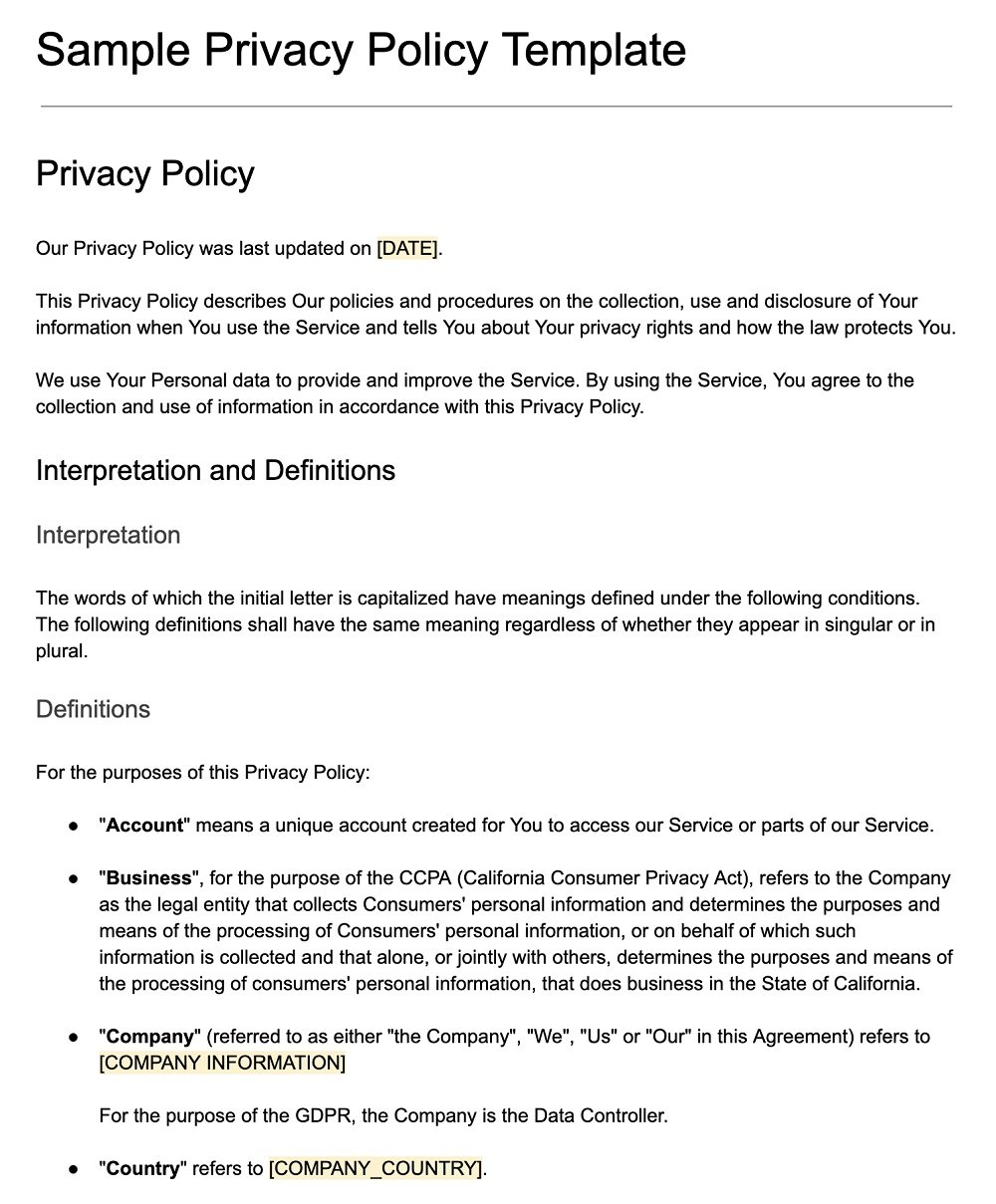
More Privacy Policy Templates
More specific Privacy Templates are available on our blog.
| Sample Privacy Policy Template | A Privacy Policy Template for all sorts of websites, apps and businesses. |
| Sample Mobile App Privacy Policy Template | A Privacy Policy Template for mobile apps on Apple App Store or Google Play Store. |
| Sample GDPR Privacy Policy Template | A Privacy Policy Template for businesses that need to comply with GDPR. |
| Sample CCPA Privacy Policy Template | A Privacy Policy Template for businesses that need to comply with CCPA. |
| Sample California Privacy Policy Template | A Privacy Policy Template for businesses that need to comply with California's privacy requirements (CalOPPA & CCPA). |
| Sample Virginia VCDPA Privacy Policy Template | A Privacy Policy Template for businesses that need to comply with Virginia's VCDPA. |
| Sample PIPEDA Privacy Policy Template | A Privacy Policy Template for businesses that need to comply with Canada's PIPEDA. |
| Sample Ecommerce Privacy Policy Template | A Privacy Policy Template for ecommerce businesses. |
| Small Business Privacy Policy Template | A Privacy Policy Template for small businesses. |
| Privacy Policy for Google Analytics (Sample) | A Privacy Policy Template for businesses that use Google Analytics. |
| Sample CalOPPA Privacy Policy Template | A Privacy Policy Template for businesses that need to comply with California's CalOPPA. |
| Sample SaaS Privacy Policy Template | A Privacy Policy Template for SaaS businesses. |
| Sample COPPA Privacy Policy Template | A Privacy Policy Template for businesses that need to comply with California's COPPA. |
| Sample CPRA Privacy Policy Template | A Privacy Policy Template for businesses that need to comply with California's CPRA. |
| Blog Privacy Policy Sample | A Privacy Policy Template for blogs. |
| Sample Email Marketing Privacy Policy Template | A Privacy Policy Template for businesses that use email marketing. |

Comprehensive compliance starts with a Privacy Policy.
Comply with the law with our agreements, policies, and consent banners. Everything is included.
